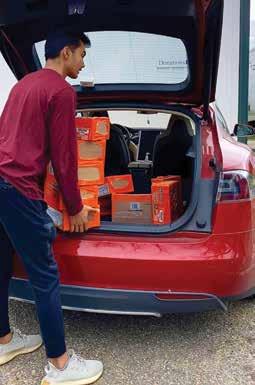
1 minute read
Peer Mentors Mend Gaps in Virtual Learning
ILLUSTRATION BY MARCIA STAIMER
While students and faculty adjusted to virtual instruction, Mason Engineering’s peer mentors stepped up to the plate to help students during the last part of the spring semester. Mason Engineering’s peer mentor center is a resource that allows undergraduates to learn from fellow students, and with the move to virtual instruction, the mentors didn’t lose sight of that goal. Some students struggled with the change, says peer mentor and information technology major Andreas Giannopoulos. “Students experienced a lot of stress all at once. We were there to not only help with the class questions but with the transition itself,” he says. Giannopoulos and systems engineering major Megan Taylor worked with Associate Dean Sharon Caraballo over the extended spring break to set up the Cisco Webex platform and make the shift to virtual mentoring smoother for peer mentors and mentees. “We wanted to troubleshoot issues and scenarios on how to best mentor with different topics using Webex,” says Giannopoulos. With practice and the knowledge in hand, Taylor and Giannopoulos created a manual for students and fellow peer mentors. “The biggest way to make this effective is the peer mentors experimenting with it and letting people know that there will be hiccups,” says Giannopoulos. “Communication is important.” Peer mentors often must think on their feet to help with various types of engineering courses, which require different types of instruction and technology to do it virtually. “We had to make sure everyone could get the same mentoring with different resources at home,” says Giannopoulos. “During this time, students ran into things they needed help with, and we wanted to be there to support those students,” says Taylor. “Our peer mentors really rose to the challenge,” says Caraballo. “We’re able to provide the communications platform, Webex, but each peer mentor needed to determine the best technology solution from what they had available to them.” Keeping this service going benefits the peer mentors themselves, too. “The COVID-19 crisis has obviously had repercussions for all kinds of workers,” says Caraballo. “I’m very glad we’re able to keep these students employed.”

—Ryley McGinnis Andreas Giannopoulos (above) and Megan Taylor (below) went above and beyond to help fellow peer mentors succeed with the transition to virtual learning. Photos provided










